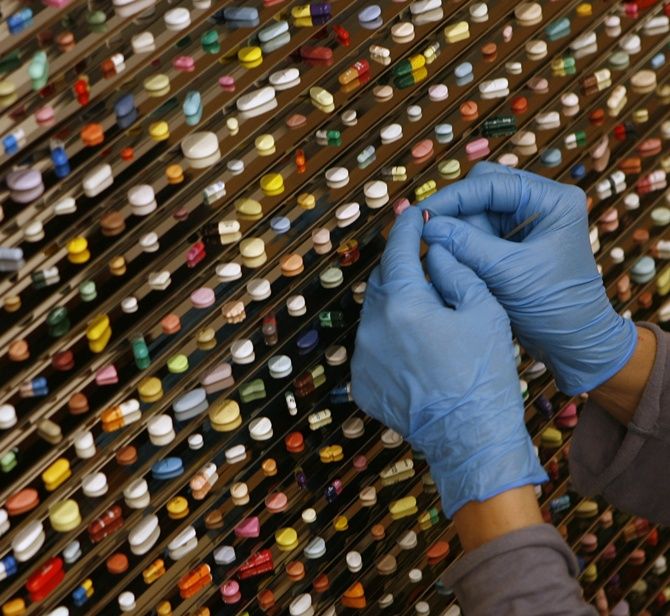To ensure equal access to health care, the government must consider it in a holistic manner and improve all parameters, says Ranjit Shahani.
 India is the fourth fastest growing economy in the world. A growing middle class, rising income levels and increased life expectancy are all indicators of a developing country.
India is the fourth fastest growing economy in the world. A growing middle class, rising income levels and increased life expectancy are all indicators of a developing country. Unfortunately, rising affluence has also led to an increase in chronic and lifestyle-related diseases. The pharmaceutical industry, and the medicines it manufactures and markets, play an important role in addressing the health care needs of our population.
With India's enormous population, one of the biggest challenges we face is providing access to quality health care for all our citizens.
Access to health care extends beyond the cost of medicine to the proximity, quality and functionality of health care infrastructure. A 2015 study by IMS Health on "Assessing the Impact of Price Control Measures on Access to Medicines in India" concluded that price controls do not improve access to medicines.
The consumption of price-controlled medicines in rural areas declined by seven per cent over 2013 and 2014, while that of non-price controlled drugs went up by five per cent.
In February this year, a study by professors Arvind Sahay and Saravana Jaikumar, from the Indian Institutes of Management (IIM) at Ahmedabad and Udaipur, corroborated these findings and found that price-capping of medicines is actually counterproductive.
The IIM study found that the Drug Price Control Order (DPCO) of 2013 has resulted in reducing the availability of essential drugs, especially in rural areas.
Access to health care extends beyond the cost of medicine to the proximity, quality and functionality of health care infrastructure. A 2015 study by IMS Health on "Assessing the Impact of Price Control Measures on Access to Medicines in India" concluded that price controls do not improve access to medicines.
The consumption of price-controlled medicines in rural areas declined by seven per cent over 2013 and 2014, while that of non-price controlled drugs went up by five per cent.
In February this year, a study by professors Arvind Sahay and Saravana Jaikumar, from the Indian Institutes of Management (IIM) at Ahmedabad and Udaipur, corroborated these findings and found that price-capping of medicines is actually counterproductive.
The IIM study found that the Drug Price Control Order (DPCO) of 2013 has resulted in reducing the availability of essential drugs, especially in rural areas.
While the DPCO is an attempt to regulate the industry, it should be noted that Indian drug prices are lower than in other developing economies and even the price increases have always been below or at par with inflation.
While the order leads to a marginal price benefit for patients, the desired outcome would be a significant upsurge in volumes and deeper penetration into the rural markets of the country.
However, the analysis of both 2013 and 1995 price controls reveals that this desired objective has certainly not been achieved. Ironically, our authorities wear it as a badge of honour that prices have been slashed for numerous medicines (this is actually cited as a proud achievement on the official website!) without any thought on the undesired consequences of such action.
While the order leads to a marginal price benefit for patients, the desired outcome would be a significant upsurge in volumes and deeper penetration into the rural markets of the country.
However, the analysis of both 2013 and 1995 price controls reveals that this desired objective has certainly not been achieved. Ironically, our authorities wear it as a badge of honour that prices have been slashed for numerous medicines (this is actually cited as a proud achievement on the official website!) without any thought on the undesired consequences of such action.
The adverse impact of the DPCO goes further. The IMS health study found that the primary beneficiaries of price controls are high-income patients, rather than low-income ones.
For low-income households that are reliant on the government system for health care, DPCO has had little or no effect on improving their ability to purchase drugs. This is supported by the fact that there is no significant penetration of DPCO molecules in rural markets.
For low-income households that are reliant on the government system for health care, DPCO has had little or no effect on improving their ability to purchase drugs. This is supported by the fact that there is no significant penetration of DPCO molecules in rural markets.
Second, the average number of DPCO molecules came down from 36 in 2013 to 32 in 2015, potentially strengthening the few already dominating companies. This limits choice and impairs industry competitiveness. As a result, some smaller players lose interest while the segment also fails to attract the attention of newer players.
Third, price control has stalled innovation in terms of new introductions
and novel treatment options, due to increased pressure on margins. Post-DPCO 2013, the number of new introductions in DPCO molecules has fallen across therapy areas and reduced competitive intensity. This trend, of fewer new introductions and fewer brands, was also seen post-DPCO 1995.
Finally, these consequences go against Prime Minister Narendra Modi's vision of "Make in India". Higher margin pressures on mid-size companies reduce R&D, investment and employment opportunities for an ever-growing potential workforce. Price control negatively impacts capacity building initiatives and discourages local talent development.
However, we can learn from the past as we strive to address our health care challenges. Our government needs to prioritise health care, strengthen infrastructure and focus on skill development; it must increase budget allocation to demonstrate this priority. We urgently need to increase our health care budget from the current one per cent to at least 2.5 per cent.
Economic development should contribute to better health. Investment from governments, in providing improved access to health care, can contribute to economic development through improved productivity, capital accumulation and reduced expense on disease treatment. Well-designed public and private health insurance schemes, along with infrastructure growth, must come into play.
This will serve to expand health care access and lower treatment costs.
Economic development should contribute to better health. Investment from governments, in providing improved access to health care, can contribute to economic development through improved productivity, capital accumulation and reduced expense on disease treatment. Well-designed public and private health insurance schemes, along with infrastructure growth, must come into play.
This will serve to expand health care access and lower treatment costs.
The government should also work with industry on more effective drug procurement systems and distribution models. State governments could procure medicines in bulk, following the example of the Tamil Nadu Medical Services Corporation, where an efficient mechanism provides medicines at highly affordable prices.
Implementation of the promised universal health assurance programme will benefit patients and help to increase access - the current out-of-pocket payment system cannot be sustained! Public insurance programmes can be supplemented by a private insurance system, to establish an affordable and high quality health care model.
What we need is a "composite" and "hybrid" model of universal health assurance that is both efficient and affordable. Continued engagement is needed by the government for supporting appropriate public-private partnerships, increasing access and capacity development.
Implementation of the promised universal health assurance programme will benefit patients and help to increase access - the current out-of-pocket payment system cannot be sustained! Public insurance programmes can be supplemented by a private insurance system, to establish an affordable and high quality health care model.
What we need is a "composite" and "hybrid" model of universal health assurance that is both efficient and affordable. Continued engagement is needed by the government for supporting appropriate public-private partnerships, increasing access and capacity development.
In a country like ours, price control can play an important role in ensuring equitable access and distribution of essential public goods. However, this cannot be the sole policy instrument that is used to address the health care challenges of our citizens.
The pharmaceutical industry continues to seek a stable and predictable policy framework which could help all stakeholders. Arbitrary price fixation of drugs, as witnessed in July 2014 and subsequently, can impair the growth of our industry and be harmful for patients.
The evidence suggests that price-capping should be used thoughtfully, judiciously and in combination with other measures to improve access to health care and medicines.
The pharmaceutical industry continues to seek a stable and predictable policy framework which could help all stakeholders. Arbitrary price fixation of drugs, as witnessed in July 2014 and subsequently, can impair the growth of our industry and be harmful for patients.
The evidence suggests that price-capping should be used thoughtfully, judiciously and in combination with other measures to improve access to health care and medicines.
As India aspires to provide quality health care for all, our government must consider health care access in a holistic manner and ensure improvement on all parameters. The focus must shift from controlling prices to collaboratively advancing a common agenda.
The author is managing director and vice-chairman, Novartis India.










